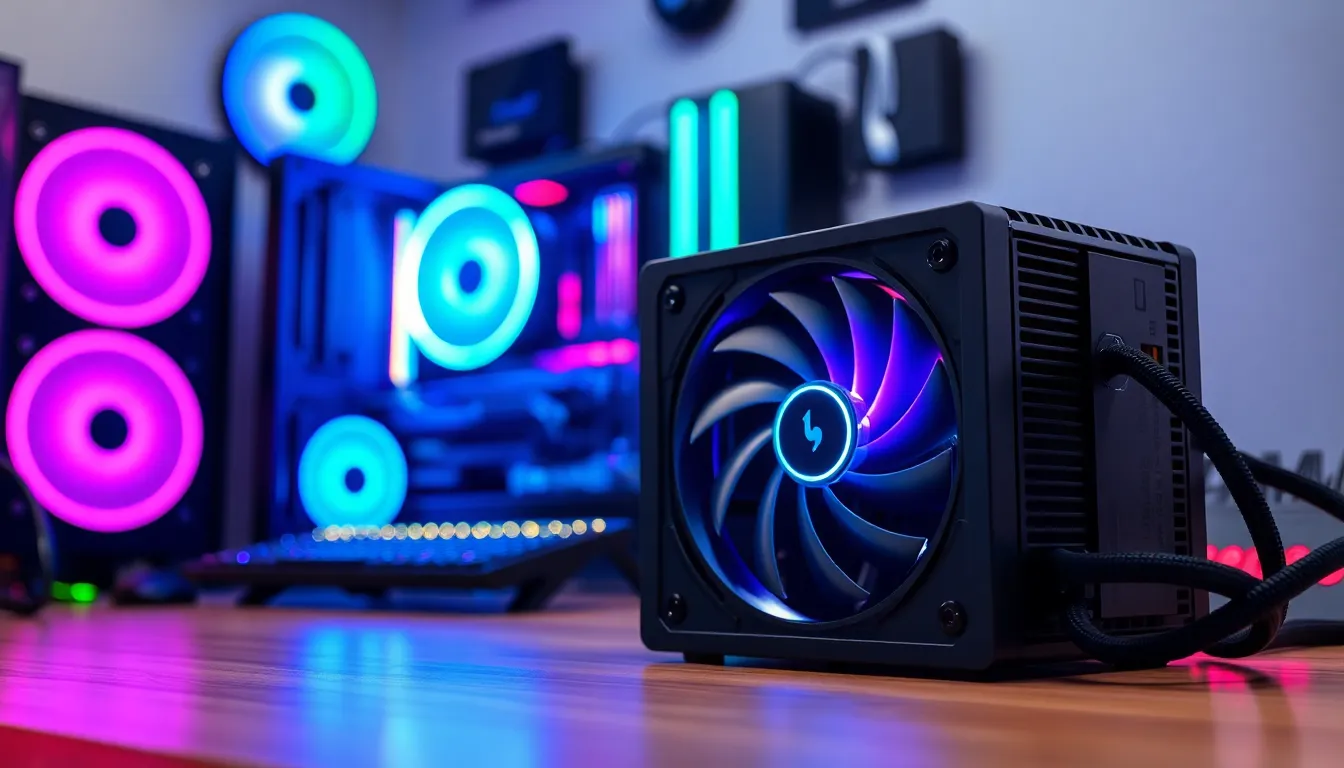In the world of gaming, power supply units (PSUs) often play the unsung hero, quietly fueling epic adventures and intense battles. Without the right PSU, even the most high-end gaming rig can turn into a glorified paperweight. Imagine gearing up for a night of gaming only to realize your PSU’s as reliable as a chocolate teapot.
Table of Contents
ToggleWhat Is PSU Gaming?
PSU gaming involves utilizing a power supply unit to ensure high-performance gaming systems operate effectively. A quality PSU delivers the necessary power to all components, enhancing gaming experiences. Choosing a reliable PSU prevents system failures, ensuring stability during intense gaming sessions.
Performance factors significantly include wattage, efficiency ratings, and modularity. Wattage determines how much power the PSU can supply; gamers often require PSUs rated between 500 to 850 watts. Efficiency ratings indicate how much power is converted into usable energy, with higher ratings, like 80 Plus Gold, being preferable for performance and sustainability.
Modularity in PSUs offers different connections based on user needs. Fully modular PSUs allow users to connect only the cables they need, reducing clutter and improving airflow within the case. Semi-modular models come with essential cables attached, while non-modular options have all cables pre-installed. Gamers often prefer modular options for their flexibility and ease of installation.
Reliability is a key consideration in PSU gaming. High-quality brands like Corsair, EVGA, and Seasonic build trusted units with extended warranties. These companies often test their products rigorously to minimize failure rates.
Noise levels also play a role in the overall gaming experience. Models equipped with quiet fans operate more stealthily, allowing for immersive gameplay without distractions. A quiet PSU enhances the overall atmosphere of gaming, particularly during long sessions.
Investing in a good PSU is vital for gamers seeking a seamless experience. A malfunctioning PSU can disrupt gameplay and compromise performance, leading to unwanted frustrations. Prioritizing a quality power supply unit empowers gamers to maximize the potential of their systems.
Importance of a High-Quality PSU

A high-quality PSU ensures optimal performance for gaming setups. Reliability and efficiency play crucial roles in enhancing the gaming experience.
Efficiency Ratings
Efficiency ratings indicate how effectively a PSU converts AC power from the wall outlet into DC power for computer components. Ratings like 80 Plus Gold or Platinum signify higher efficiency levels, typically exceeding 90%. Gamers benefit from lower energy consumption and reduced heat output with these ratings. A high-efficiency PSU leads to lower electricity costs over time, making it a worthwhile investment for gamers.
Power Reliability
Power reliability is essential for maintaining stability during intense gaming sessions. A reliable PSU provides consistent power delivery to each component, preventing unexpected shutdowns or crashes. Trusted brands like Corsair, EVGA, and Seasonic focus on quality control and performance. Choosing a PSU with a solid warranty further ensures peace of mind. Relying on brands with a reputation for excellence helps gamers avoid disruptions and maximize performance.
Choosing the Right PSU for Gaming
Selecting the right power supply unit (PSU) is essential for any gaming setup. Several factors must be considered, including wattage, modularity, and reliability.
Understanding Wattage Requirements
Wattage requirements directly affect a gaming system’s performance. High-demand components, such as graphics cards and processors, significantly influence overall power needs. Gamers typically require PSUs rated between 500 and 850 watts for optimal functionality. Calculating wattage based on individual component requirements ensures sufficient power delivery. Online calculators can simplify this process by providing accurate estimates. Higher wattage offers headroom for future upgrades, making it a wise investment.
Modular vs. Non-Modular PSUs
Modular PSUs enhance organization and airflow within gaming rigs. With modular designs, users connect only the cables they need, reducing clutter and improving aesthetics. Non-modular options, while often less expensive, can lead to unnecessary cable management challenges. Each type has its advantages; gamers who prioritize cleanliness and airflow may favor modular PSUs. Ultimately, the choice between modular and non-modular relies on personal preference and specific system requirements.
Tips for Optimizing PSU Performance
Maintaining optimal performance from a power supply unit remains vital for enhancing gaming experiences. Gamers should focus on proper cable management and effective temperature control.
Cable Management
Effective cable management enhances airflow and reduces clutter within the gaming setup. Investing in modular PSUs directly contributes to this benefit, as users can connect only the cables they require. Organizing cables neatly can prevent tangling, minimizing the risk of signal interference. Using cable ties or sleeves provides additional organization and improves aesthetics. Ensuring cables aren’t obstructing fans or vents leads to better cooling performance. Ultimately, a tidy setup contributes to a more enjoyable and efficient gaming environment.
Temperature Control
Temperature control plays a crucial role in maintaining PSU performance. Keeping the power supply unit cool ensures components function at optimal levels, reducing the likelihood of overheating and failures. Utilizing high-quality fans within the PSU contributes to effective heat dissipation. Placing the PSU in a well-ventilated area aids in maintaining lower temperatures. Regularly cleaning dust from vents enhances airflow, further minimizing heat buildup. Monitoring temperatures with software tools provides insights into PSU performance, allowing users to make informed adjustments as necessary.
Common PSU Issues in Gaming
Power supply units can experience various issues that may hinder gaming performance. Identifying these problems quickly can prevent further complications.
Signs of a Failing PSU
Frequent system crashes often indicate PSU failure. Random shutdowns during gameplay may also signal inadequate power delivery. Overheating components can stem from a malfunctioning PSU as well. Unusual noises, such as buzzing or clicking sounds, point to internal problems. Fluctuating voltages can cause instability, leading to performance drops. Observing these signs allows gamers to address issues before they escalate.
Preventive Measures
Choosing a reliable PSU brand ensures consistent quality and performance. Regularly cleaning dust from vents helps maintain airflow, preventing overheating. Organizing cables improves airflow, reducing clutter and enhancing cooling efficiency. Monitoring temperatures with software tools assists in identifying potential issues early. Investing in surge protectors protects equipment from power spikes and fluctuations. Prioritizing these preventive measures enhances the longevity and reliability of gaming setups.
A quality power supply unit is a cornerstone of any gaming setup. Gamers who prioritize reliable PSUs can enjoy seamless gameplay and enhanced performance. By understanding wattage requirements and choosing between modular and non-modular options, they can tailor their systems to meet specific needs.
Effective cable management and temperature control further optimize PSU performance. Recognizing common issues such as overheating or unusual noises can prevent potential setbacks. Investing in a reputable brand with a solid warranty not only ensures reliability but also provides peace of mind. With the right PSU in place, gamers can fully unleash the potential of their systems and immerse themselves in their gaming experiences.








